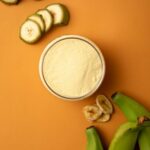Have you considered how a single ingredient choice can influence both your supply chain and environmental impact? For ingredient buyers, selecting raw materials that meet quality standards while supporting sustainability goals is no small task. Organic Green Banana Flour is increasingly seen as a versatile and environmentally responsible option, especially when produced using regenerative farming methods. Its nutritional profile, functional properties, and eco-friendly production make it a valuable ingredient for forward-thinking buyers.
Understanding Regenerative Organic Production
Regenerative Organic Green Banana Flour is derived from unripe bananas grown under regenerative farming systems. These systems go beyond basic organic standards by focusing on soil health, biodiversity, and carbon sequestration. Unlike conventional methods that may degrade the land over time, regenerative practices aim to restore and enhance it. This approach benefits not only the environment but also the long-term productivity of farms, ensuring a reliable supply for buyers.
Nutritional and Functional Benefits
This flour offers a unique combination of health-promoting qualities and functional versatility. High in resistant starch, it supports digestive health and helps regulate blood sugar levels. Its mild flavor makes it suitable for a variety of applications, including baked goods, smoothies, and gluten-free formulations. Because it absorbs moisture efficiently, it can improve texture and extend shelf life in certain products. For ingredient buyers seeking multifunctional raw materials, this is a significant advantage.
Sustainability Through Waste Reduction
One of the notable strengths of Regenerative organic dried banana flour production is its ability to utilize bananas that might otherwise go to waste. By processing surplus or imperfect fruit into flour, producers reduce food waste while adding value to the supply chain. This creates an additional revenue stream for farmers and contributes to more circular agricultural systems.
Meeting Market Demand for Clean Label Ingredients
Consumer demand for clean label and plant-based products continues to grow. This flour meets both criteria, making it an attractive option for manufacturers catering to health-conscious markets. With no need for artificial additives or chemical processing, it aligns with industry trends toward transparency and natural sourcing.
Traceability and Quality Assurance
Regenerative farming methods often include rigorous tracking and documentation, allowing buyers to verify the origin and quality of their ingredients. This level of traceability builds trust with end consumers and supports compliance with international food safety and sustainability standards. Buyers can confidently communicate these sourcing practices to their customers, enhancing brand value.
Economic and Community Impact
Sourcing regenerative organic ingredients supports farming communities by providing fair pricing and stable demand. The emphasis on soil health and biodiversity also improves farm resilience, helping communities adapt to climate change. Over time, these benefits can lead to stronger regional economies and more consistent ingredient quality.
Applications Across Industries
From bakery and confectionery to nutritional supplements and specialty beverages, the applications for this flour are broad. Its gluten-free nature and mild taste allow it to integrate seamlessly into both traditional and innovative product lines. Buyers who work across multiple sectors can benefit from its versatility.
Overcoming Supply Chain Challenges
While demand is growing, securing a consistent supply may require careful planning. Seasonal variations, transport logistics, and certification processes can all influence availability. Building direct relationships with producers and establishing long-term contracts can help mitigate these risks while ensuring a steady supply.
Conclusion
For ingredient buyers aiming to align sustainability, functionality, and market demand, regenerative organic green banana flour presents a compelling choice. From reducing food waste to improving soil health, it offers benefits that go beyond the ingredient itself. By incorporating this flour into product formulations, buyers can meet consumer expectations while contributing to a more sustainable and resilient global food system.

